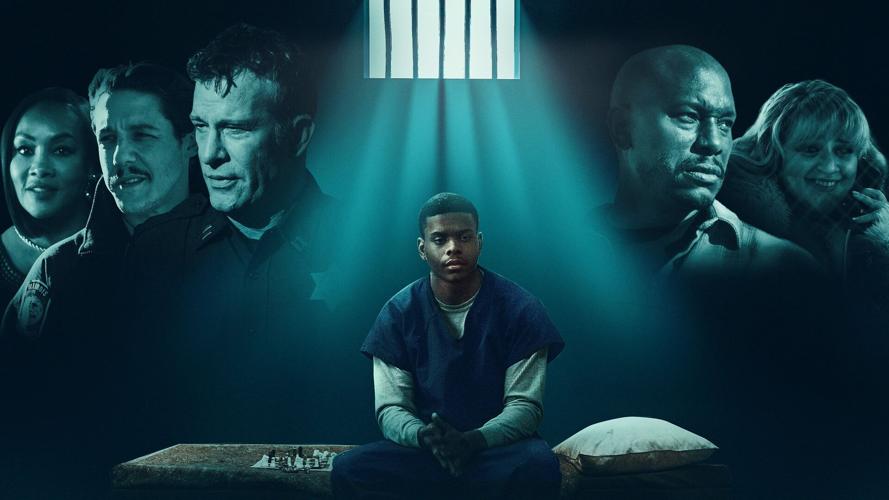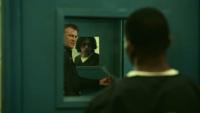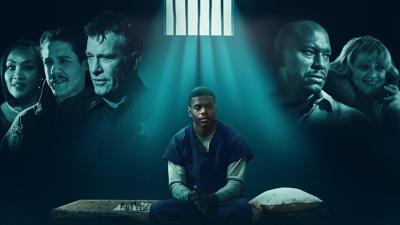In 2006, Quawntay Adams, born in 1975 in Compton, California, was serving a 35-year prison sentence for marijuana possession. The reason the sentence was so long is because it was his third strike. California is the primary state with a "Three-Strikes" law that puts harsher penalties for more than two felony convictions. Usually, those convictions have to be violent crimes, but a marijuana possession doesn't seem like it would trigger a third strike.
What the film doesn't explain is that his sentencing was partly due to various juvenile offenses. There's a passing reference, but the film doesn't underline the fact that prior to 2006, he attempted to escape twice. He was finally transferred to a prison in Alton, Illinois, 25 miles north of St. Louis, Missouri. It was a maximum security facility, but in May of that year, Adams figured out a way to escape.

Aubrey Joseph (The Inspection and Cloak & Dagger) stars as Quawntay Adams who was nicknamed "Bosco." At first, the film establishes how difficult being in that kind of prison is. Bosco wasn't in general population where he could interact with other prisoners. He was basically in solitary confinement, locked in a windowless box and under surveillance 24 hours straight, only let out to shower.
Obviously, this film's themes go to the inhumane treatment of men in such prison conditions, whether they deserve it or not. It's perhaps difficult to do better than what was done in Ava DuVernay's When They See Us (2019), a series about a group of Black and Latino men falsely convicted. In terms of performance, Joseph doesn't come close to touching Emmy-winner Jharrel Jerome and in terms of direction, filmmaker Nicholas Manuel Pino doesn't come close to touching what DuVernay did in that series.

There have been a litany of films and TV shows about men in prison. Among them have been narratives where we see men attempt to escape. One of the most iconic was Escape From Alcatraz (1979) but there was even the more recent Escape at Dannemora (2018). This film walks us through the steps that Bosco took to break out. Unfortunately, once those steps are revealed, the film ceases to be either intriguing or enthralling. Quite frankly, the whole thing becomes rather boring. Through voice-over narration, Joseph tries to sell us on Bosco's nervousness and frustration throughout the escape process, but it's not sold as well. Pino's direction does little to aide. There's simply little to make any of it exciting.
It's not as if I needed the prison escape to be as clever and colorful as in films like I Love You Phillip Morris (2009) or The Grand Budapest Hotel (2014), or as convoluted as the TV show Prison Break (2005). One of the reasons I wasn't as intrigued or enthralled is because Pino's film gives us barely anything about Bosco himself. His past juvenile offenses go unmentioned and his previous attempts at escaping go unexplained and undepicted.

Reportedly, the reason he orchestrated this escape because he wanted to be there for his daughter. Yet, aside from a passing reference, his pending fatherhood isn't felt as a factor at all. There are a few flashbacks to Bosco's father, played by Tyrese Gibson (Fast X and Transformers), and there are thematic moments that say how Bosco doesn't want to be like his father who was absentee, but I'm not sure the script connects those moments to Bosco's future daughter. There is a scene at the end that shows us Bosco's daughter, but it's too little, too late.
Nikki Blonsky (Hairspray and Geography Club) co-stars as Tammy, the woman who helps Bosco to escape. Tammy is a woman that Bosco never knew prior to being locked up. His relationship was one he developed solely over the phone, responding to a lonely-hearts ad in the newspaper. Now, it's arguable that Bosco developed this relationship with ulterior motives. A lot of their conversations became tinged with romantic overtones, designed to make her think he was falling in love with her when it was all most likely manipulations in order to get her to give him money and an eventual mode of transportation, once he broke out.

When it came time for him to break out, Tammy was his getaway driver. It's clear that he lied to her and didn't say he was breaking out. She thought he was getting a legitimate release, so it's evident that he did manipulate her to some extent. The question arises though if Bosco's feelings for her were real or all a lie to get her to help him, putting herself in trouble for no reason.
Whether his feelings were real or not, this film never confronts him directly with that question. This film doesn't confront him because it doesn't want him to answer that question. It doesn't want to reveal that the answer is probably that yes he lied and manipulated her. He used her and then threw her away. However, the real Quawntay Adams is a producer on this film, so depicting himself in such a negative light, or any negative light, was likely something he wanted to avoid. He likely wanted to portray himself as the hero, which if that's the case, the most heroic thing Adams does isn't even depicted in this film.

The post-script tells us in text on the screen that in 2020, Adams fired his attorney and represented himself in federal court, managing to get himself released after only serving 16 years of his 35-year sentence. His efforts paved the way for future inmates and Adams even started working to help inmates in similar situations as him. To me, that's the more interesting story, not the prison break. That post-script actually reminded me of ABC's For Life (2020), a TV show about a convicted Black man who represented himself and got released. It was my favorite show that year. This film could've been selfsame if it had bothered to dig into those 2020 details, but it doesn't.
Rated TV-MA-VL.
Running Time: 1 hr. and 44 mins.
Available on Peacock.













